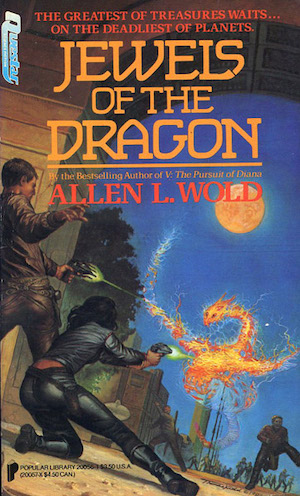In this bi-weekly series reviewing classic science fiction and fantasy books, Alan Brown looks at the front lines and frontiers of the field; books about soldiers and spacers, scientists and engineers, explorers and adventurers. Stories full of what Shakespeare used to refer to as “alarums and excursions”: battles, chases, clashes, and the stuff of excitement.
Sometimes, especially during the summer, you want a book that’s chock-full of action and adventure…something that takes you for an exciting ride without requiring a lot of thinking. Looking for just such a book, I recently ran across Jewels of the Dragon on my bookshelf and realized that this competently written tale of adventure—an updated version of the planetary romance sub-genre—was exactly what I was looking for. It features a young man searching for his lost father on a lawless prison planet filled with mysterious ruins, monsters, and dangers—a perfect cure for boredom.
I don’t always remember when and where I bought a book, but this one is an exception. I was in Portland, Maine, on business, and stopped at a used bookstore. I had read Crown of the Serpent, another adventure featuring the character Rikard Braeth, and enjoyed it, so I was pleased to find another story featuring the same character. This one also had a great cover by Tom Kidd, a favorite artist of mine who always produces grabby illustrations with great composition and lots of clever details. To my surprise, this book was the first in a series I thought had started with Crown of the Serpent. Back in those days, to avoid scaring away readers who’d missed the first book, you would often find sequels that were not labeled as such, and written in a way that they stood on their own.
The book was published by Questar, a rather short-lived science fiction imprint from Warner Books and Popular Library, which launched in the late 1980s and disappeared in the early 1990s. They published some excellent authors, such as Greg Bear, C. J. Cherryh, Robert Silverberg, Mike Resnick, Joan D. Vinge, Alan Dean Foster, and Octavia E. Butler. Questar also published the Helmsman series by Bill Baldwin, which I especially enjoyed—you can find my review here.
About the Author
Allen L. Wold (born 1943) is an American author of science fiction and fantasy novels, as well as several non-fiction books on computing. There are three books in his Rikard Braeth series: Jewels of the Dragon, published in 1986, Crown of the Serpent, published in 1989, and The Lair of the Cyclops, published in 1992. Jewels of the Dragon was a very personal story for him, as it drew upon his relationship with his own father. He has written six books in the fantasy Blood Ring series, eight stand-alone novels, and three tie-in novels for the V television series, along with a number of shorter works.
Lost Civilizations in Space
Lost civilizations, ruins, and hidden treasures have always been compelling features of adventure fiction. King Solomon’s Mines, written by H. Rider Haggard in 1885, is a classic example from the last century. Edgar Rice Burroughs’ Tarzan books were packed with lost civilizations. Boy’s adventure books, like the Don Sturdy books of the 1920s (written under house name Victor Appleton), were full of archaeologists and explorers in far-off lands. Both the popular Indiana Jones and Mummy movie franchises harken back to these early 20th-century tales of exploration and adventure.
Buy the Book


A Psalm for the Wild-Built
The intrigue of lost civilizations carried over into science fiction, and as the unexplored areas of the Earth began to shrink, planetary romances from authors like Burroughs, Leigh Brackett, and C.L. Moore gave us new places to explore on Mars and Venus. Andre Norton filled book after book with space adventures where the protagonists encountered cities, spaceships, treasures, and devices left behind by mysterious aliens called Forerunners. And as science fiction became more sophisticated, megastructures like Larry Niven’s Ringworld and Arthur C. Clarke’s Rama inspired awe and fascination.
The protagonists of these tales, whether drawn by a thirst for knowledge or a desire for riches, took the readers on journeys of discovery, uncovering mysteries and unlocking riddles of the past. One of the chief attractions of science fiction in any era is the lure of the unknown, and this type of tale has at its core the unraveling of mysteries, always a compelling way to drive a narrative. The online Encyclopedia of Science Fiction does not have an article specifically on the theme of lost civilizations, but it does have an article that discusses the related theme of “Ruins and Futurity.”
Jewels of the Dragon
Young Rikard Braeth has arrived at Kohltri Station, which orbits the planet Kohltri at the edge of the Federation. He is on a quest to find his father Arin, a “Gesta,” or spacefaring buccaneer/adventurer, who disappeared when Rikard was 13. Rikard’s mother was the Lady Sigra Malvrone, who fell in love with Arin after he was hired to rescue her from kidnappers. They lived together happily until bad investments depleted their savings; Arin went out to make one last big score, and never came back. Sigra died brokenhearted three years after her husband left, and now, after finishing college, Rikard is spending the last of the family’s money to search for his father.
Rikard discovers that Kohltri is a kind of prison planet. Criminals who reach the world, as long as they agree never to leave, are allowed to live out their lives there. The planet is lawless, and very much reminded me of the enclave in Robert Heinlein’s famous story “Coventry.” It’s reminiscent of the imaginary Wild West of the old movies—a place where everyone packs a pistol, and might makes right.
Rikard runs into problems with the authorities on the station, led by the corrupt Anton Solvay. He meets Leonid Polski, a Federation Police Colonel searching for the “Man Who Killed Banatree,” a mysterious outlaw whose crimes are so heinous that even Kohltri is not a safe haven. Polski knows of, and actually admires, Rikard’s father, who was suspected of many crimes during his career, but never left any evidence behind.
Rikard uses his education as a historian, and some employs computer hacking skills, to ferret out the information he needs to locate his father and eventually makes his way down to the planet. As he attempts to follow his new leads, he runs afoul of local crime bosses, and has to fight off a number of muggers. He finds he handles these situations quite capably, and enjoys the action. He also encounters energy creatures that the locals call “dragons,” which seem to live only partially in our plane of existence. It also turns out the planet is full of ruins from a civilization thought to be long dead, and infested not only by dragons but by mysterious fungus creatures.
Rikard eventually befriends another spacefaring Gesta, a woman named Darcy Glemtide. She is the perfect companion, showing him the ropes, helping him procure an armored, leather-like suit that constitutes local attire, coaching him in shooting, and even serving as a potential love interest (although romance is not what this story is about). Rikard had received an implant when he was young, and inherited a massive .75-caliber pistol from his father, but they never seemed to work as intended. It turns out the gloves that come with his new attire are what was needed to complete the circuit, and he instantaneously becomes a crack shot for whom time slows down when he draws his sidearm.
My one criticism of the book is that Darcy is perhaps too perfect of a companion, feeling like more of a plot device than a character at points. And the way Rikard falls comfortably into his new life of adventure and his new combat abilities is a bit too perfect as well. But this is a tale driven primarily by action and the unfolding of mysteries; nuanced character development is a secondary concern.
Since mystery is so central to the narrative, I will keep my recap even shorter than usual to avoid spoiling the fun. The story will eventually reveal the secrets at the heart of the corruption on the planet, the nature of its mysterious ruins, and the origin of some of its peculiar flora and fauna. Even the mystery of the “Man Who Killed Banatree” gets solved along the way. Rikard eventually uncovers the secret of his father’s disappearance in a sequence that turns out to be very moving, giving the book an emotional depth that is often lacking in adventure tales. The narrative moves at a rapid pace that keeps the pages turning right up until the very end. The heyday of the planetary romance may be behind us, but this book lives up to the legacy of those old adventure stories.
Final Thoughts
I thoroughly enjoyed Jewels of the Dragon when I first read it in the 1980s, and found it just as enjoyable the second time around. The action and the many mysteries kept me engaged, and I would recommend the book to anyone who enjoys a good science fiction adventure. You can still sometimes find paperback copies of the Rikard Braeth books in used bookstores, and the books are available in electronic and paper form from various sources online.
And now I’d like to hear from you, especially if you’ve read Jewels of the Dragon. And if you haven’t, I’d be interested in other books you’ve enjoyed that feature lost cities, ancient treasures, and mysterious ruins. There are a few weeks of summer left, and still room for some fun and compelling summer reading.
Alan Brown has been a science fiction fan for over five decades, especially fiction that deals with science, military matters, exploration and adventure.










